Victoria Sadler's Blog, page 21
February 27, 2014
Theatre Review: The One, Soho Theatre
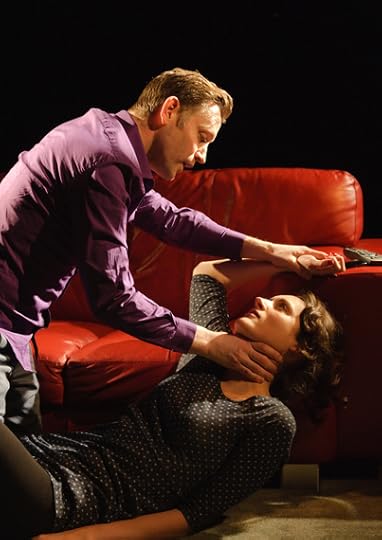
On the face of it, an evening watching a play on the deterioration of a relationship from discontent to abuse might not seem desirable. But when the talent behind it is one of the country's finest up and coming theatre companies, then it most definitely is.
The One is a night spent with Harry (Rufus Wright) an English professor, and his former-student-now-girlfriend Jo (Phoebe Waller-Bridge) as they stay up all night waiting for news on the expected birth of Jo's nephew or niece.
But this is no quaint couple sitting on the sofa passing the time. It's clear from the start that this is an unhealthy relationship but what starts as bickering and quarrels starts to get out of hand through the combination of alcohol and an unexpected visit from Kerry (Lu Corfield), an ex-flame of Harry's who remains obsessed with him.
The talent behind this play is DryWrite, the ground-breaking and award-winning team behind hits such as Mydidae and Fleabag. Vicky Jones and Phoebe Waller-Bridge are the two Artistic Directors behind DryWrite and here, Vicky Jones writes and Phoebe Waller-Bridge stars.
Waller-Bridge wowed in Fleabag last summer, a performance for which she won The Stage's Best Solo Performance 2013 and Joint Winner, Critics' Circle Most Promising Playwright Award, 2014. And her unnerving talent for playing complicated, amoral and scheming women, on show here again, is a little frightening. But she inhabits Jo with such force that you are once again in no doubt to her talents.
With Fleabag and now The One, Drywrite is carving a niche for itself in dark plays that are both disturbing and viciously funny. It's another star turn from Waller-Bridge and confirms that, in alliance with Vicky Jones, Drywrite is truly a team to watch.
The shadow of Who's Afraid of Virginia Woolf? looms large over this play, the famous couple addicted to their deeply destructive and abuse relationship. But Vicky Jones' writing is so sharp, fast and contemporary that it feels very current.
Nor does Vicky Jones pull back in her writing as Harry and Jo's relationship slides deeper into abuse and vitriol. To say The One touches on difficult and controversial issues such as when sex becomes rape, and those addicted to violent, abusive relationships would be to underplay the writing - this play crashes head into these subjects at full speed.
And that's the bravery in Jones' writing, what makes this piece so exciting - it's complete rejection of there being boundaries in art as in life. No subject is considered out of bounds or to be handled carefully. If theatre is to truly reflect life as it is then work of this style and standard is critical.
The play is short at 75 minutes but that is to its advantage. It allows the writing to be punchy, shocking and means the characters never have to explain themselves - we are just witnesses to behaviour that exists but remains taboo. Any longer and you feel the material would lose its stylised and exciting pace, and the material would have been spread a little thin.
Instead we're left, as the sun rises, with an ending that makes perfect sense. It's unclear whether anything has been learnt or resolved between these three very troubled characters. It's an ending perfectly in keeping with what has gone before, yet still surprising rather than a cliché. To pull that off underscores yet again the talent that is on show.
Soho Theatre, London
To March 30, 2014
Published on February 27, 2014 12:41
February 24, 2014
Feminism Is Not About Female Behaviour
Week before last I wrote a blog about why Benedict Cumberbatch should stop censoring his Cumberbitches. Incredibly my article was not put into his hands for a good read as only last week Mr Cumberbatch reiterated his view of the term Cumberbitches, considering the term "subservient, demeaning" and "They've gone down the route of reversing the negative backlash of however many years of feminism and it was a little bit worrying".
As well as pissing me off (again), it got me thinking about his constant inference that he knows more about what makes a good feminist than his female fans. I'll tell him now, he doesn't. I'll say it clearly - female behaviour has nothing to do with feminism. Feminism is the fight back against male behaviour towards women.
When oh when will men stop "correcting" women on their feminism? It is not demeaning to women, how they choose to represent themselves. It is demeaning though, and extraordinarily patronising in the most perversely ironic of ways, for a man to appropriate feminism to his side of the argument to "correct" female behaviour.
The internet's favourite actor though is not the only man to think women might need a hand in understanding this whole feminism thing. But sadly it's not just men who seem determined to define acceptable female behaviour - there are too many women only too keen to take up that mantle also.
Caitlin Moran is seen as one of this country's leading feminist lights but her book How to Be a Woman is full of corrective analysis. In a visit to strip club she declares that "any argument in their favour is fallacious" and as for the women themselves, "Girls, get the fuck off the podium - you're letting us all down."
Because of course the women HAVE to be complete victims to work in a strip club. I mean, no one actually wants to work there, RIGHT? And the girls surely don't know what's good for them. Load of crap and riddled with stereotypes and good feminist/bad feminist judgment.
But then Moran has the temerity to say that "we shouldn't have a problem with burlesque" because "with burlesque...the power rest[s] with the person taking their clothes off." I mean, talk about someone talking shit about something they know nothing about.
So all those women I performed with in burlesque, when they performed under their burlesque alter-egos it was ok but those who then went on to do a shift at Spearmint Rhino suddenly betrayed the cause? They were the same women!!
And if it's not "burlesque good, stripping bad", Moran's taking on pubic hair - "keep it trimmed, keep it neat but keep it what it's supposed to be."
Again, it is not female behaviour that should be subject to disapproval or approval. Not only does it rob men of accountability for their demands of women but it also judges women incapable of making a "correct" choice without "education."
Waxing is not a feminist issue. Whether a woman waxes her hair or not, it doesn't make her any more or less of a feminist. Some women want to wax everything off because that's what they want. Good for them. Other women like to let it all grow. Good for them. I don't care what choice they make and neither should anyone else.
I can't believe we've gone from men telling women how to be a woman, to women doing just the same. Indeed the very title of the book itself is an explicit example of how feminism persists in analysing female behaviour rather than male.
This is nothing new though. Even the great suffragette Emmeline Pankhurst, the woman who orchestrated a decade-long female campaign of violence and civil disobedience, despised any woman who didn't extol the virtues of chastity and prim external appearance. Indeed she even disowned her own daughter Sylvia when she had a child out of wedlock.
It's also one of the reasons why I won't read Sheryl Sandberg's Lean In. Setting aside that its title is the kind of glib advice you'd normally see on a fridge magnet, it infers to me that it's female behaviour that needs to change if women want to succeed. Yeah, because that's what's been holding women back - their own behaviour.
Deeply depressing. And not borne out by any of my own (not insignificant) executive experience in the Square Mile. There are many superb female candidates for the top jobs in the City - and they are not looked over because they are struggling to make themselves heard. It's the men who are stopping female equality in the workforce, not women.
This ongoing forensic analysis of female behaviour has profound consequences.
Young women growing up adoring these celebs who criticise female behaviour find their own opinions and preferences censored or "corrected", causing them to doubt themselves, increase their insecurity and take responsibility for perceived inappropriate behaviour. This is then reinforced by a misogynist society which seeks to hem women in and approve of only a very narrow view of acceptable female behaviour.
This then has repercussions for serious hot topics such as rape, domestic violence and abuse. Whether its rape victims being cross-examined on their dress or conduct, or women out on Friday nights told not to drink, to avoid eye contact with men, to not leave their drink unattended for a moment, to not take unlicensed cabs home, to always use a well-lit path, to not wear short dresses...
I know, how about this instead? MEN! Look at yourselves here. And stop telling us that the way we behave brings such crimes our way. Change your behaviour, not ours. We do nothing wrong and have a right to exist and to live our lives with abuse, violence, aspersions on our moral code and without your patronising "corrective" suggestions.
And women, don't do that work for them either.
Real feminism should defend women's choices. This demonisation of "other" women has got to stop. Feminism is not about a privileged few insisting they know what's best for the rest. The focus must be on male behaviour, not female.
The next feminist polemic should be titled How to Be A Man, because that's what feminism needs to tackle. In fact, I'm going to stop right here and go start that book right now.
As well as pissing me off (again), it got me thinking about his constant inference that he knows more about what makes a good feminist than his female fans. I'll tell him now, he doesn't. I'll say it clearly - female behaviour has nothing to do with feminism. Feminism is the fight back against male behaviour towards women.
When oh when will men stop "correcting" women on their feminism? It is not demeaning to women, how they choose to represent themselves. It is demeaning though, and extraordinarily patronising in the most perversely ironic of ways, for a man to appropriate feminism to his side of the argument to "correct" female behaviour.
The internet's favourite actor though is not the only man to think women might need a hand in understanding this whole feminism thing. But sadly it's not just men who seem determined to define acceptable female behaviour - there are too many women only too keen to take up that mantle also.
Caitlin Moran is seen as one of this country's leading feminist lights but her book How to Be a Woman is full of corrective analysis. In a visit to strip club she declares that "any argument in their favour is fallacious" and as for the women themselves, "Girls, get the fuck off the podium - you're letting us all down."
Because of course the women HAVE to be complete victims to work in a strip club. I mean, no one actually wants to work there, RIGHT? And the girls surely don't know what's good for them. Load of crap and riddled with stereotypes and good feminist/bad feminist judgment.
But then Moran has the temerity to say that "we shouldn't have a problem with burlesque" because "with burlesque...the power rest[s] with the person taking their clothes off." I mean, talk about someone talking shit about something they know nothing about.
So all those women I performed with in burlesque, when they performed under their burlesque alter-egos it was ok but those who then went on to do a shift at Spearmint Rhino suddenly betrayed the cause? They were the same women!!
And if it's not "burlesque good, stripping bad", Moran's taking on pubic hair - "keep it trimmed, keep it neat but keep it what it's supposed to be."
Again, it is not female behaviour that should be subject to disapproval or approval. Not only does it rob men of accountability for their demands of women but it also judges women incapable of making a "correct" choice without "education."
Waxing is not a feminist issue. Whether a woman waxes her hair or not, it doesn't make her any more or less of a feminist. Some women want to wax everything off because that's what they want. Good for them. Other women like to let it all grow. Good for them. I don't care what choice they make and neither should anyone else.
I can't believe we've gone from men telling women how to be a woman, to women doing just the same. Indeed the very title of the book itself is an explicit example of how feminism persists in analysing female behaviour rather than male.
This is nothing new though. Even the great suffragette Emmeline Pankhurst, the woman who orchestrated a decade-long female campaign of violence and civil disobedience, despised any woman who didn't extol the virtues of chastity and prim external appearance. Indeed she even disowned her own daughter Sylvia when she had a child out of wedlock.
It's also one of the reasons why I won't read Sheryl Sandberg's Lean In. Setting aside that its title is the kind of glib advice you'd normally see on a fridge magnet, it infers to me that it's female behaviour that needs to change if women want to succeed. Yeah, because that's what's been holding women back - their own behaviour.
Deeply depressing. And not borne out by any of my own (not insignificant) executive experience in the Square Mile. There are many superb female candidates for the top jobs in the City - and they are not looked over because they are struggling to make themselves heard. It's the men who are stopping female equality in the workforce, not women.
This ongoing forensic analysis of female behaviour has profound consequences.
Young women growing up adoring these celebs who criticise female behaviour find their own opinions and preferences censored or "corrected", causing them to doubt themselves, increase their insecurity and take responsibility for perceived inappropriate behaviour. This is then reinforced by a misogynist society which seeks to hem women in and approve of only a very narrow view of acceptable female behaviour.
This then has repercussions for serious hot topics such as rape, domestic violence and abuse. Whether its rape victims being cross-examined on their dress or conduct, or women out on Friday nights told not to drink, to avoid eye contact with men, to not leave their drink unattended for a moment, to not take unlicensed cabs home, to always use a well-lit path, to not wear short dresses...
I know, how about this instead? MEN! Look at yourselves here. And stop telling us that the way we behave brings such crimes our way. Change your behaviour, not ours. We do nothing wrong and have a right to exist and to live our lives with abuse, violence, aspersions on our moral code and without your patronising "corrective" suggestions.
And women, don't do that work for them either.
Real feminism should defend women's choices. This demonisation of "other" women has got to stop. Feminism is not about a privileged few insisting they know what's best for the rest. The focus must be on male behaviour, not female.
The next feminist polemic should be titled How to Be A Man, because that's what feminism needs to tackle. In fact, I'm going to stop right here and go start that book right now.
Published on February 24, 2014 13:50
February 19, 2014
'A Taste of Honey' as Sweet as Ever in National Theatre Revival
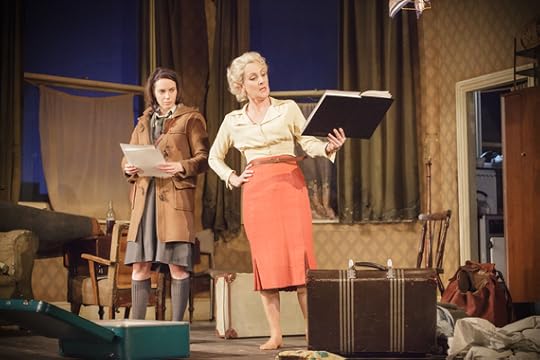
A Taste of Honey was one of the few plays I studied at school where my love for the piece wasn't ruined by lacklustre teaching. And in this passionate and dramatic revival at the National Theatre, all those ingredients that made the play so revolutionary when it debuted remain.
Written when she was only 19, Shelagh Delaney's masterpiece was almost incendiary when it was first performed in 1958. None of the other "kitchen sink" dramas of that time were written by women, and none of the others brought the margins of society - a single mother in poverty, a pregnant teenager, black sailors and young gay men - front and centre.
But beyond the sensationalist headlines of the time (the Daily Mail wrote Delaney off as an "angry young woman" - which they would probably still do today) there is a truly wonderful story.
A Taste of Honey is about of two women - single mother Helen (Lesley Sharp) and her teenage daughter Jo (Kate O'Flynn). Their relationship is complex and unhealthy. Helen had Jo when she was very young, and the bitterness of her lost youth is practically tangible.
Trying to make up for lost time, Helen is a good-time girl looking for a rich man. But her constant absences and frequent abdication of parental responsibility has caused Jo to take on duties and obligations she should be too young to understand. And on top of all this, this family unit - single mothers controversial for the 1950s and still the bane of the right wing today - is incredibly poor.
The play starts with mother and daughter moving into an impoverished terrace flat in Salford, which by any standards today would be condemned. But rather than focusing on settling her daughter down at school or creating a home, Helen throws herself into a whirlwind romance with a wealthy but alcoholic younger man. Yet Jo is a young woman looking for love too and what she doesn't get from her mother, she finds in the arms of a young black sailor on shore leave.
Given the success of the 1961 film adaptation, there might have been a temptation to explore a variety of settings for this revival, such as the local pub and a shop. But Director Bijan Sheibani has shrewdly resisted that, keeping all the drama contained in one set - the squalid front room of this terraced flat.
Containing the action in this one, depressing location reinforces the prison mentality of the piece - two women trapped in an existence they both desperately long to flee, adding real weight to their dreams and flights of fancy, and poignancy when those dreams are inevitably shattered.
The acting is absolutely superb. Lesley Sharp completely inhabits the complex role of a mother in a deeply destructive battle between her dreams and her responsibilities. The supporting cast (Eric Kofi Abrefa, Harry Hepple and Dean Lennox Kelly) are also excellent. But it is Kate O'Flynn who shines as Jo, the girl too old for her age but too young for the responsibilities she finds put upon her.
Revolutionary in its time, it saddens me to write that I still felt I was watching a type and style of play, a setting, that is still rare in theatre. Two women, working class, the struggles of poverty, sexuality... It all haunts me because even today, 50 years later, we still don't see enough of these plays. Theatre remains dominated by the upper and middle class, and by men.
Unlike other "kitchen-sink dramas" (personally, I've always considered A Taste of Honey to be more than that) this has not dated, reflecting the multi-layered brilliance of the writing. Watching it now, it comes across as a courageous and brutally honest story about survival, the reality of life when the dreams have gone.
I left more in awe of Shelagh Delaney's writing than ever before. As a woman I found this piece, written in the 1950s by a 19 year old woman, more resonant than any of the feminist plays that have opened this year (Rapture Blister Burn, Blurred Lines, The Mistress Contract). Helen and Jo are real, multi-dimensional women, conflicted, both victims and victors. But ultimately survivors.
National Theatre, London
To May 11, 2014
Published on February 19, 2014 12:39
February 16, 2014
Orwell's 1984 Reimagined for the Post-Snowden Age at the Almeida Theatre
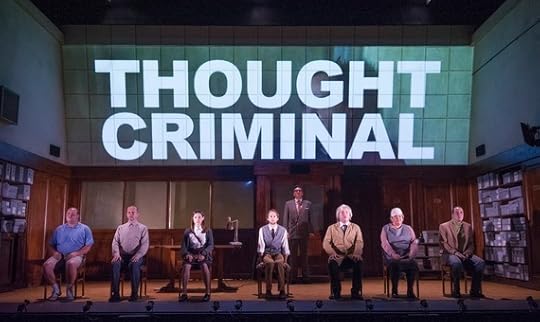
In this post-Snowden age, where privacy it seems is all but dead, a reinterpretation of Orwell's Big Brother and the omnipresent surveillance state certainly has a lot to offer. But this production at the Almeida is over-engineered, with high concept overwhelming the text, creating an inconsistent, uneven show.
It starts with the cast all sitting on stage talking about the book - Winston's diary/1984. It takes a while to work out what is going on but eventually it materialises that we are watching a book club set in 2084 who have been reading 1984. And that, to them, 1984 is a piece of historical fact.
As the book club chat, we see Winston Smith (Mark Arends) in 1984 start his forbidden diary, the writing that will lead to his downfall. Smith lives and works in Oceania, a powerful totalitarian state where the population is under constant surveillance and where the actions of the state are never questioned.
Yet through this first third of the play, because of this ongoing narration by the book club, Winston is quite a passive character. It's extremely hard to get to know him or sympathise with his situation as he is largely mute. As a result, we are robbed of the opportunity to fully appreciate Winston's suffering, what is driving him to rebel like this.
Once the book club eventually leaves, Winston's rebellious affair with the mysterious Julia (Hara Yannas), a co-worker who may well be an agent of the state's Thought Police, happens so suddenly that again, it's hard to be emotionally involved. After only a few minutes the couple have gone from perfect strangers to plotting the downfall of the state.
I was not alone in struggling to empathise. Lines such as Julie's exclamation that she hates the state because "they want to abolish the orgasm" and Winston's criticism of her that she's "only a rebel from the waist down" caused ripples of laughter around the auditorium rather than shudders of fear.
The production design is also confusing. I think it was trying to be timeless but the heavy wooden furniture, Winston's cardigans and hostess trolleys all made it seem very 1970s.
Modern elements were present - the state's police are SWAT teams with assault rifles and there are plenty of spy cameras and mobile phones, but why weren't the book club reading 1984 on tablets or iPads? Surely if you want to capitalise on Snowden's revelations, on the privacy of online data, you would make more of computers, how we are all plugged in and how that may well cause our own downfall.
The play though has a very strong final third, when finally Winston comes face to face with O'Brien (a superb performance from Tim Dutton), the state apparatchik that breaks Winston's resistance in Room 101. The final long scene of torture is very graphic - so much so that a couple of the audience felt the need to leave the room. It is superbly done.
Director Rupert Goold recently gave an interview to the Guardian, after taking over as Artistic Director at the Almeida, where he talked about how "every show should aim to change theatre." That desire to take a heavy hammer approach may explain some of the issues here.
Of course we don't live in an Orwellian totalitarian state today - the fact that we can read 1984 and stage productions of it is testament to that. However there is plenty in Orwell's nightmarish vision that rings true today. And this production is at its best when it shows us these moments, rather than hammering the message home.
Daily, society in 1984 is required to participate in two minutes of hate, where the people hurl abuse at footage of the prescribed enemies of the state, refusing to let the "traitors" be heard or to explain their position. And that is done so well here, a dark reflection of how politicians in the West simplify our enemies to serve their own ends.
And the manipulation of the ever-changing realpolitik of 1984, where Oceania was once in alliance with Eurasia, now a sworn enemy, offers itself as a mirror on the shifting politics today, especially in the Middle East where dictators we supported for decades are now (and, they would have us believe, always have been) enemies of liberal democracy.
The purpose of the futuristic book club is to cause us to question whether we in 2014, not long after Winston is broken in 1984, are living in similar? I appreciate the production is trying to tag on to the Snowden revelations with that but the debate of whether we live in an Orwellian society masquerading as a democracy is not a new one.
However a cultural discussion and representation of these big political questions is worthy but this production didn't work for me. The Donmar is showing Privacy, a new play by James Graham, later this year specifically on the surveillance state today. Here's hoping that is a more successful exploration of this important subject.
Almeida Theatre, London
To March 29, 2014
Published on February 16, 2014 06:21
February 12, 2014
Why Benedict Is Wrong to Censor His Cumberbitches
His fans just can't get enough of him. Only this week, after generating near hysteria with his appearance at the Elementary Con in Birmingham, over 22,000 devoted fans clamoured for only 200 available tickets to see Benedict Cumberbatch record the last episode of the popular BBC Radio 4 comedy Cabin Pressure.
And if that attention wasn't enough, a couple of days ago the actor was also reportedly chased down the streets of London by adoring (and a little misguided, it has to be said) fans after seeing a performance of the terrific Coriolanus at the Donmar Warehouse.
Still, the internet's favourite actor has been terribly gracious towards his fans, despite the fact that some of their behaviour must be unsettling at best and deeply worrying at worst (god help the poor woman who becomes his girlfriend). But one area that he has picked his devotees up on is their chosen name.
The Cumberbitches. That's what the most devoted fans called themselves. I actually liked it. I thought it was great word play, sharp, instantly recognisable and just a little bit in your face. And as soon as the term was coined, it went viral as quickly as 'credit crunch.'
It's a term that dwarfs all the other attempts (usually led by the stars themselves) to give fanbases catchy names, like Kylie's Lovers and Rihanna's Navy. Cumberbitches is right up there with Gaga's Monsters. The term is so good that the person behind it really should think about going into PR.
Only the actor himself was reluctant to be too supportive of the name. "It's not even politeness," he told Caitlin Moran in an interview for the Times. "I won't allow you to be my bitches. I think it sets feminism back so many notches. You are... Cumberpeople."
But Cumberpeople, and other alternatives generated by fans in the face of this censure such as Cumberfans, Cumberbabes, Cumbercollective... No, they're just not anywhere near as brilliant as Cumberbitches.
But more than this, why should the Cumberbitches redefine themselves because the object of their affection says so? And more importantly, why is it anti-feminist to call yourself a bitch?
Of course I'm in the realms of a circular argument here as if Mr Cumberbatch's remarkably fanatical following want to be his bitch then no doubt their willingness to do anything he says would extend to renaming themselves at his pleasure. But let's put that small technicality aside for one moment!
There is something deeply ironic about a man telling women how they should define themselves, in the name of feminism. And something deeply uncomfortable too. But Mr Cumberbatch's opinion crystallises a widely held view amongst men and women - that a woman cannot be emancipated and also be submissive, and with all the sexual and slut-shaming connotations that go along with that classification.
Benedict Cumberbatch's intention (I am assuming) is not to take a dominant role over his fans but rather to persuade them of the error of their ways. And that's the intention I want to address.
How a woman defines herself is her prerogative - and hers alone. If a woman wants to call herself a bitch, in this case the inference being that they want to be submissive, she can do that and still be a feminist. This is all rolled up into the good feminist/bad feminist debate but the fact is, a woman can be emancipated and be submissive.
No doubt Benedict Cumberbatch's intentions are well-meaning but correcting women on their feminist principles is a dangerous business. Cumberbitches can still be feminists. And that's why I, for one, am hoping for a Cumberbitches revival. The name's just too good and has too much attitude to let it die away.
Though maybe some of them might need to take the fanaticism down a few notches.
And if that attention wasn't enough, a couple of days ago the actor was also reportedly chased down the streets of London by adoring (and a little misguided, it has to be said) fans after seeing a performance of the terrific Coriolanus at the Donmar Warehouse.
Still, the internet's favourite actor has been terribly gracious towards his fans, despite the fact that some of their behaviour must be unsettling at best and deeply worrying at worst (god help the poor woman who becomes his girlfriend). But one area that he has picked his devotees up on is their chosen name.
The Cumberbitches. That's what the most devoted fans called themselves. I actually liked it. I thought it was great word play, sharp, instantly recognisable and just a little bit in your face. And as soon as the term was coined, it went viral as quickly as 'credit crunch.'
It's a term that dwarfs all the other attempts (usually led by the stars themselves) to give fanbases catchy names, like Kylie's Lovers and Rihanna's Navy. Cumberbitches is right up there with Gaga's Monsters. The term is so good that the person behind it really should think about going into PR.
Only the actor himself was reluctant to be too supportive of the name. "It's not even politeness," he told Caitlin Moran in an interview for the Times. "I won't allow you to be my bitches. I think it sets feminism back so many notches. You are... Cumberpeople."
But Cumberpeople, and other alternatives generated by fans in the face of this censure such as Cumberfans, Cumberbabes, Cumbercollective... No, they're just not anywhere near as brilliant as Cumberbitches.
But more than this, why should the Cumberbitches redefine themselves because the object of their affection says so? And more importantly, why is it anti-feminist to call yourself a bitch?
Of course I'm in the realms of a circular argument here as if Mr Cumberbatch's remarkably fanatical following want to be his bitch then no doubt their willingness to do anything he says would extend to renaming themselves at his pleasure. But let's put that small technicality aside for one moment!
There is something deeply ironic about a man telling women how they should define themselves, in the name of feminism. And something deeply uncomfortable too. But Mr Cumberbatch's opinion crystallises a widely held view amongst men and women - that a woman cannot be emancipated and also be submissive, and with all the sexual and slut-shaming connotations that go along with that classification.
Benedict Cumberbatch's intention (I am assuming) is not to take a dominant role over his fans but rather to persuade them of the error of their ways. And that's the intention I want to address.
How a woman defines herself is her prerogative - and hers alone. If a woman wants to call herself a bitch, in this case the inference being that they want to be submissive, she can do that and still be a feminist. This is all rolled up into the good feminist/bad feminist debate but the fact is, a woman can be emancipated and be submissive.
No doubt Benedict Cumberbatch's intentions are well-meaning but correcting women on their feminist principles is a dangerous business. Cumberbitches can still be feminists. And that's why I, for one, am hoping for a Cumberbitches revival. The name's just too good and has too much attitude to let it die away.
Though maybe some of them might need to take the fanaticism down a few notches.
Published on February 12, 2014 08:51
February 9, 2014
David Bailey's Stardust on Show at the National Portrait Gallery
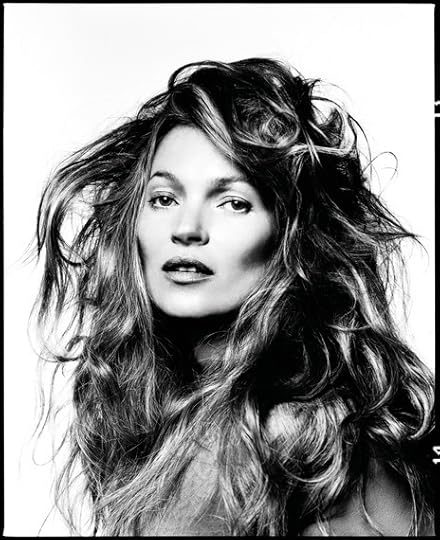
David Bailey is one of the world's most distinguished and distinctive photographers and this exciting exhibition at the National Portrait Gallery, the largest exhibition ever of Bailey's work, reflects the diversity of his extraordinary career as well as putting on show his most defining images.
The scale of this exhibition is vast. There are over 300 portraits on display and each has been selected by Bailey himself. Of course what dominates the exhibition are the black and white portraits of the rock stars, fashion icons, artists, actors... All the great and good have posed for David Bailey and the great and good are all on show here.
Lennon & McCartney, the Rolling Stones, Warhol, Kate Moss, Helmut Newton Vivienne Westwood, Freddie Mercury, Mandela, Dali, Johnny Depp... It'd probably just be quicker to list those who haven't sat for him.
These images will be the ones that draw in the crowds but many of the performers are, well, performing - Jack Nicholson laughing manically, Bowie being glacial and complex, Beyoncé being flawless... All that is pretty standard.
But it's when you see Bailey capturing a Mick Jagger unsure of himself, Damon Albarn emanating insecurity or a George Michael portrait from 1985, when the man was the biggest heart-throb in the world, where he's looking deeply conflicted and troubled that you realise Bailey's talent in capturing what even the most experienced performers can try to hide.
David Bailey has bristled at the suggestion that this is a retrospective of his work, preferring it described as a collection of his favourites. Either way, the exhibition is a great way to introduce those only familiar with his work on celebrities into the photo journalism work Bailey has done and continues to do.
In 1984, as reports of the famine in Ethiopia started to emerge, Bailey went out to the region to report on the tragedy as a photographer. His images of starving babies and defeated mothers are haunting even today, to an audience that could be considered numb to images of suffering.
It's this part of Bailey's work that captures the emotions and it's clearly a line in his work that he is deeply passionate about as many of similar projects are reflected in the exhibition.
There is a sadly nostalgic collection of photos of London's East-End in 1968, of Bethnal Green and Brick Lane. Emotive pictures of people drinking pints in working men's clubs and rows of boarded up shops, all completely unrecognisable from the area now.
There's also a large number of images from his recent travels to Nagar Falls, a mountainous region in North-East India, and previously from his travels to Papua New Guinea and Australia to capture images of tribespeople and village elders with traditions and a way of life that is being gradually eroded, soon to vanish.
Yet it's interesting that in spite of capturing all these celebrities and agent provocateurs, sensuality and sexuality only comes through in the photos of his wife, Catherine Bailey, who David photographed extensively.
A whole room in the exhibition is dedicated to photos of Catherine and though there is plenty of nudity, it's more erotic than exploitative. And it reveals a lot about the man behind the camera that of all the women that have sat for this self-confessed ladies' man, it's only photos of his fourth wife that are so sensual and intimate.
National Portrait Gallery, London
To June 1, 2014
Photo credit: Kate Moss by David Bailey, 2013 © David Bailey
Published on February 09, 2014 07:06
Theatre Review: The Mistress Contract, Royal Court Theatre
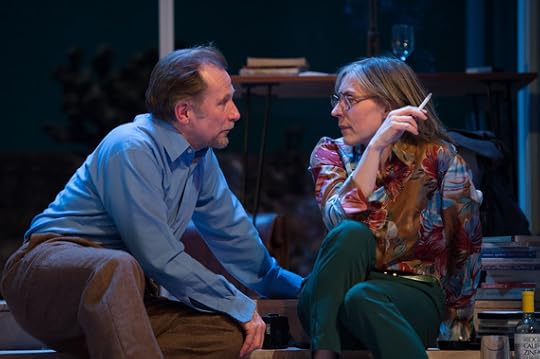
The Mistress Contract at the Royal Court is such a missed opportunity. The source material, a true story of a couple in the USA who've engaged in a sex services contract for the past 40 years, is fascinating but this stage adaptation is a disappointment.
It's 1981 on the West coast of America and 42 year old divorcee She (neither man nor woman is ever identified) proclaims to the man she is having an affair with that she wants their relationship to be formalised in a contract. Scarred by a miserable marriage that left her with limited finances, She (Saskia Reeves) proposes a transparent arrangement to He(Danny Webb) where he will pay for her living arrangements and reasonable costs in exchange for all sexual services, provided without question.
She sees this as a feminist act, as a way of getting what she wants, financial security and freedom, the "price of admission into [her] intimacy." He sees it as great way to get what he wants and signs up with enthusiasm. And so this "experiment" (as She refers to it as) begins.
Only nothing actually happens. The first 20 minutes of this 90 minute play is spent discussing this set up. Only the two characters - and there are no other characters in this play - don't disagree. It's just 20 minutes without any conflict, which is quite dull to watch.
This lack of spark and limited subject matter discussion continues through the rest of the play, which is a surprise as the adaptation was written by Abi Morgan, one of this country's finest writers, and it's directed by Vicky Featherstone, artistic director of the Royal Court.
The Mistress Contract is promoted as a feminist play - a play where gender politics is front and centre - but very little of the play explores the feminism in this set-up. At the heart of this is a woman who thinks she is empowering herself by having this contract. That is a rich area to explore but in fact nothing is actually questioned.
Not once in 40 years does She doubt her feminist principles in setting up this contract, not once does she question what she has lost rather than what has been gained. She has foregone love and affection, even the possibility of true happiness. Not even her own daughter's stable marriage causes her to question the lack of love, the lack of affection, in her own set up. You feel like getting up and shouting, where is the love?
Even a brief reference to prostitution doesn't spark any row or cause She to question her road map. An interesting discussion on She's sexual satisfaction briefly makes an appearance when He is surprised to learn She doesn't orgasm each time. He is genuinely concerned, maybe as an affront to his own ego, but nevertheless he tries to address this.
And here's a genuinely fascinating point. Maybe in drawing up the contract, She overlooked that her own sexual satisfaction was no longer relevant or applicable to her situation. How does she feel about that, as a woman and a feminist? It's a point that's never explored for as soon as the subject comes up, it disappears again and we never know whether She ever gets sexual satisfaction.
Certainly He and She show no physical affection or intimacy with each other on stage. They circle each other endlessly, never once comfortable in each other's personal space. It's a very cold arrangement and this lack of warmth never changes, giving the audience little to engage with.
You're just wishing for something to happen, and nothing really does. This play sort of limps along with the couple never really experiencing any difficulties - there are never moments where either threatens to tear up the contract. Conversely neither ever shows real happiness or jubilation with the arrangement.
Nor does the direction or set design give us much to connect with. Though He and She age gracefully throughout the play, the one-room set never changes. The set is a striking glass-fronted lounge that looks over the deserts of Western America, but there's no decorative change which would give us an indication of what characters are feeling on the inside. Nothing changes in this room in 40 years.
And little from the outside makes an impression either. Gender politics in the USA over the past 40 years has been a vicious battleground with very profound discussions on women in the workplace, abortion, marriage rights, women in religion and even the possibility of women in the White House grabbing the headlines. But none of this permeates the play at all. She and He seem to live in a social and cultural vacuum.
This subject, this true life story, offered up so much to explore and given the talent attached to the project, expectations were high for this production. Maybe that is part of the problem, that this disappoints so much because so much was expected. But even the most forgiving are likely to agree that this hollow production could and should have been so much more.
Royal Court Theatre, London
To March 22, 2014
Published on February 09, 2014 06:17
February 1, 2014
Theatre Review: Fear and Loathing in Vegas, Vault Festival

Fear and Loathing in Vegas is cult property. The brilliance and craziness that flows from those pages is practically palpable. But not all of that magnetism has found its way into this keynote production at the Vault Festival 2014.
The story follows Raoul Duke (Ed Hughes), the character Hunter Thompson bases on himself, and his attorney Dr. Gonzo (Rob Crouch), as they take a drug-fuelled trip to Las Vegas to cover a track race and then, subsequently, a District Attorney's conference.
The plot keeps its narrative drive well in the first half but kind of loses its way after the interval where it gets a little bogged down in playing recorded tapes rather than keeping to the story.
But there is plenty of charisma and humour in Rob Crouch's performance as Duke's attorney. A larger than life character, Crouch dominates the stage as far more a troublesome travelling companion than a safe pair of hands.
Unfortunately his performance also dominates over Ed Hughes who gives a rather lacklustre performance as Raoul Duke. Fear and Loathing doesn't need the two leads to run a funny man/straight man set up as reality kind of takes the place of the straight man here (or, as Hunter would have us believe, he is the straight man in a world that's truly crazy).
Duke's craziness and charisma should be bouncing off the walls. But the supporting ensemble make up for a lot of that with cracking performances as a myriad of characters from highway cops to district attorneys, from Las Vegas showgirls wayward whacked-out love interests. Their sudden metamorphoses into lizards and reptiles, reflecting how they are seen through Duke's and Gonzo's drug haze, are particularly impressive.
The set design from Rosie Moon is inventive, imbuing the production with a lot of its personality. In the cramped stage area she's created a versatile set that moves effortlessly from being a convertible Cadillac to a hotel bedroom, then from being a poolside bar to a casino floor.
The set design is complemented by a creative use of projections and lighting. The instantly recognisable Ralph Steadman illustrations that are so synonymous with the Fear and Loathing book are beamed onto the bare concrete walls along with evocative landscape shots of Nevada and the flashing neon signs of Vegas.
The production has a spritely pace and the many witty sequences of the drug-fuelled pair navigating the crazy world of Vegas certainly generate the laughs, which is lucky as if you go to this show it is highly likely you will be in immense discomfort.
Seating is packed in on a series of thin wooden benches. These benches are so damn uncomfortable they make the benches at Shakespeare's Globe seem like sofas. My back started clicking midway through the second half, which played havoc with my attention.
No doubt others will see the wooden benches as integral and in keeping with a show in the effortlessly cool Vault tunnels but personally I don't believe entertainment should be an endurance test.
This production isn't without its flaws but it's a brave and enjoyable effort to tackle very challenging source material.
Vault Festival, London
To March 8, 2014
Published on February 01, 2014 13:12
Theatre Review: Happy Days, Young Vic Theatre
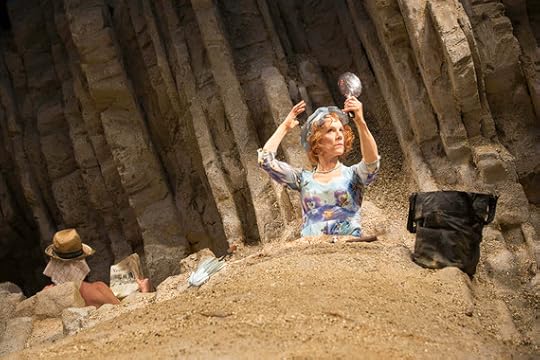
Considering this is a Samuel Beckett play about a woman trapped waist deep in rubble and rock, the title of Happy Days may be ironic. But in this superb production it is a beautifully poignant reflection on the struggles of the human spirit against almost impossible obstacles.
With a crackle of white noise and a brilliant flash of light, Happy Days bursts into life. Winnie (Juliet Stevenson) is immovable, stuck in the steep incline of a rocky slope that dominates the auditorium.
Winnie's life is a harsh one. Not just jammed in a desolate landscape, she also has to contend with the heat of the sun relentlessly beating down on her. But through sheer force of will and character, Winnie looks for the joy in all the little things, in her routine and in the company of her husband Willie (David Beames) - all of which bring her happy days.
How she came to be like this, Beckett never reveals. Rather than cursing or ruminating on the incident or the cause of her situation, Winnie passes her long days chatting to herself and her husband - though Willie prefers to stay as mute as possible - and playing with the contents of her large black handbag. Winnie's trappings are literal but of course this resonates with us because of the metaphorical limitations of our own lives.
Beckett monologues are tough, damn tough but Juliet Stevenson makes it seem so easy. She talks almost without interruption for the whole two hour piece. The fears, the insecurities, the reminisces and the laughs all weave, all flow effortlessly together to create the stream of thought that is Beckett's hallmark. And she imbues the text with hope, with despair, with all the emotions of the human spirit. Juliet Stevenson's performance is one of extraordinary skill.
You would think there isn't much to direct in a play about a women embedded in rocks up to her waist with just a black bag and a parasol within arm's reach but there is a very clever use of space and movement in this production. Director Natalie Abrahami wisely keeps Willie elusive, always just out of sight for Winnie, causing her to crane, to stretch constantly to see him.
The set design from Vicki Mortimer is bold and dramatic. Little falls of gravel occasionally roll down the rocky slope, an omen of what's to come. But it's a great twist on the more usual sand-dunes. The desolateness of the bare rocks are more emotive, more troubling.
Every single aspect of this production is flawless - awesome writing, awesome acting, awesome direction, awesome set design, awesome sound... Really, this production is faultless.
This is high concept theatre though. Not everyone is going to relish spending almost two hours listening to a monologue on finding life, the universe and everything in the routine and the mundane. But personally I live for the times when theatre is this brave and this brilliant.
Young Vic Theatre, London
To March 8, 2014
Published on February 01, 2014 07:24
January 28, 2014
Theatre Review: King Lear, National Theatre
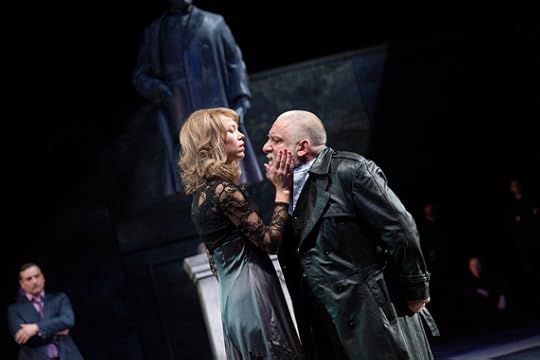
In this version of King Lear at the National Theatre, Sam Mendes and Simon Russell Beale have created a dark, violent depiction of the last days of a mad dictator.
Following other recent Shakespearian productions at the National, this Lear is brought into a contemporary setting. Sam Mendes, who directs, has set this Lear in a dystopian world based very much on the dictatorships that were the sad hallmark of the 20th century. Lear is a tyrant, yes, but with his army of terrifying blackshirts at his beck and call, and the public squares dominated by statues of himself looming over his broken populace, Lear's empire owes much of its appearance to Stalinist Russia and Hitler's Germany.
But all power diminishes. And Lear finds himself in a fight both to keep a grip on his sanity and to prevent his circling enemies from taking power for themselves. And inevitably, from a man who has long since lost touch with reality, the self-sabotage is in full effect. When Lear wilfully humiliates and banishes daughter Cordelia (Olivia Vinall) for refusing to flatter him with lies like her deceitful sisters (Kate Fleetwood and Anna Maxwell Martin) he pushes away the one person who truly loves him.
This combination of a modern dictatorship in self-destruction as its insane leader completely unravels makes this production look and feel very similar to Downfall, Oliver Hirschbiegel's extraordinary film based on Hitler's final days. Certainly there are many parallels but this is also an exceptionally violent production that doesn't shy away from the barbaric cruelty in the text. The eye-gouging, the throat sliding... it's all there. And with an unexpected murder thrown in too.
The bloodshed was a bit too much for a few in the audience who visibly winced and turned their heads away - a few didn't return after the interval. But I thought it was necessary and truthful to the text and the interpretation. Dictatorships indulge the cruel and this is as true in Lear as it is in reality.
But at the heart of this production is a truly brilliant performance by Simon Russell Beale. The quality of his performances are so high in everything that he does that we've come to expect it almost as standard, which is unfair on the man given how hard he must work on his roles.
Lear is a tough character to play. Shakespeare never shows him in his pomp - Lear's power, health and sanity are already in decline when the play starts. But in Simon Russell Beale's hands, this portrayal of a man so long alienated from balanced reasoning or accountability is completely believable.
The scars of Lear's legacy as a tyrant are already apparent in his court - family and servants cower as soon as he enters the room. But this is also an aging man battling the onset of dementia. Beale is as convincing in his moments of terrifying rage as he is in the delicate, tender portrayal of man both aware and unaware of what is happening to his mind without it ever becoming cliché-ridden or pitiful.
The production isn't without its flaws. As often happens in a piece with an exceptional lead actor, not all of the cast are quite able to match that level of performance, though special praise must go to Stephen Boxer as Gloucester, Adrian Scarborough as the brave and wise Fool and Anna Maxwell Martin as the morally corrupt, almost sadistic Regan for superb performances.
And the pace and tone of the scenes without Lear, where the conspiring court and whispering cliques hatch their plans, isn't quite there - some tension is missing. But the achievements on show outweigh these few issues.
This production came with huge expectations - the run was sold out almost as soon as tickets went on sale. That burden of expectation would weigh heavy on any show. But definitives are always elusive in art so to hope this would be the greatest production of Lear you could ever see is unfair on the creatives. Nevertheless this is an interpretation of exceptional quality.
More tickets go on general sale on February 14 but these will go quickly. If you are unable to get a ticket then do bear in mind that this version of King Lear will be broadcast in cinemas nationwide as part of the NT Live programme on May 1, 2014. If you can catch it, do. It's quite a production that can keep you transfixed for 3 ½ hours. And this is quite a production.
National Theatre, London
To May 28, 2014
Published on January 28, 2014 11:19



